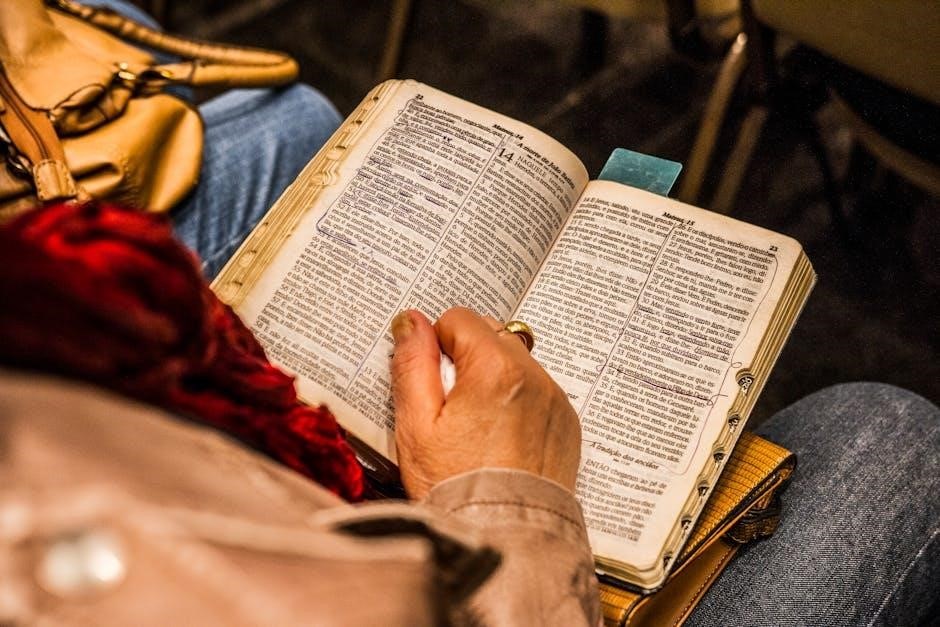
spiritual lessons from the book of ruth pdf
The Book of Ruth‚ a beautiful story of loyalty and redemption‚ offers profound spiritual lessons on faith‚ trust‚ and God’s providence in human lives.
Context and Background of the Story
The Book of Ruth is set during the time of the Judges‚ a period marked by spiritual and moral decline in Israel. The story begins in Bethlehem‚ where a severe famine forces Elimelech‚ Naomi‚ and their two sons to migrate to Moab. Tragedy strikes as Elimelech and his sons die‚ leaving Naomi and her daughters-in-law‚ Ruth and Orpah‚ as widows. Despite Naomi’s urging‚ Ruth refuses to leave her‚ famously vowing loyalty in Ruth 1:16-17. This pivotal moment sets the story in motion‚ showcasing Ruth’s commitment and faith. The narrative transitions as Naomi and Ruth return to Bethlehem‚ where Ruth’s humility and hard work catch the attention of Boaz‚ a kinsman redeemer. This historical and cultural backdrop highlights themes of loss‚ loyalty‚ and divine providence‚ laying the foundation for the spiritual lessons woven throughout the book.
Overview of Key Spiritual Themes
The Book of Ruth is rich with spiritual themes that resonate deeply with believers. Central to the narrative is the concept of God’s sovereignty and providence‚ as His hand is evident in guiding Ruth and Naomi through their trials. The story emphasizes faith and trust in God‚ particularly through Ruth’s unwavering commitment to Naomi and her eventual integration into the family of Israel. Another key theme is redemption‚ exemplified through Boaz‚ who serves as a kinsman redeemer‚ foreshadowing Christ’s role as humanity’s ultimate Redeemer. The book also highlights loyalty‚ humility‚ and grace‚ with Ruth’s selfless actions and Boaz’s kindness illustrating these virtues. Additionally‚ the story underscores God’s heart for the nations‚ as Ruth‚ a Moabite‚ becomes part of the lineage of King David and‚ ultimately‚ Jesus Christ‚ showing God’s plan to bless all peoples.

Ruth’s Loyalty and Commitment
Ruth’s unwavering loyalty to Naomi and her faith in God exemplify profound spiritual commitment. Her selfless devotion became a cornerstone of her journey and legacy.
Ruth’s Devotion to Naomi as a Spiritual Example

Ruth’s unwavering devotion to Naomi serves as a powerful spiritual example of selfless love and faith. Despite facing loss and uncertainty‚ Ruth chose to remain with Naomi‚ demonstrating extraordinary loyalty and trust in God’s providence. Her decision to identify with Naomi’s people and God‚ as expressed in her famous vow in Ruth 1:16-17‚ highlights her commitment to spiritual surrender. Ruth’s actions exemplify how faith can lead to radical life changes‚ showing that true devotion involves putting others’ needs above one’s own. Her story inspires believers to trust God’s sovereignty‚ even in difficult circumstances‚ and to embrace His grace with humility. Ruth’s journey reflects the transformative power of faith and love‚ making her a timeless example of spiritual dedication.
The Significance of Ruth’s Famous Vow in Ruth 1:16-17
Ruth’s vow in Ruth 1:16-17 is a pivotal moment‚ showcasing her deep spiritual commitment. She declares‚ “Where you go‚ I will go‚” symbolizing her unconditional loyalty to Naomi and her trust in Naomi’s God. This vow transcends cultural boundaries‚ as Ruth‚ a Moabite‚ chooses to align herself with Israel and their faith. Her words reflect a profound spiritual surrender‚ emphasizing faith over fear and trust over uncertainty. This passage teaches the importance of making God-centered decisions and highlights the transformative power of devotion. Ruth’s vow serves as a timeless example of how faith can lead to radical life changes‚ inspiring believers to trust God’s plan and embrace His grace wholeheartedly. It underscores the theme of divine providence and redemption‚ central to the book’s message.

Naomi’s Journey from Bitterness to Joy
Naomi’s journey from bitterness to joy reflects her spiritual transformation‚ as she learns to trust God despite loss‚ ultimately finding hope and redemption through Ruth’s loyalty.
Naomi’s Spiritual Transformation
Naomi’s spiritual transformation is a central theme in the Book of Ruth‚ showcasing her journey from bitterness and despair to hope and trust in God. Initially‚ Naomi felt abandoned by God‚ overwhelmed by the loss of her husband and sons. However‚ through Ruth’s unwavering loyalty and faith‚ Naomi began to see God’s providence at work. Her return to Bethlehem and the kindness of Boaz symbolized God’s redemption and provision. Naomi’s story teaches us that even in darkness‚ God’s sovereignty guides our lives‚ transforming sorrow into joy. Her transformation reflects the power of faith and community‚ highlighting how spiritual growth often emerges from relational support and trust in divine goodness.
Naomi as a Mentor and Mother Figure
Naomi‚ though weathered by personal trials‚ emerges as a vital mentor and mother figure in the Book of Ruth. Her relationship with Ruth highlights her role as a guide‚ teaching her about Hebrew customs‚ faith‚ and community. Despite her own bitterness‚ Naomi’s maternal instincts and wisdom helped Ruth navigate a foreign culture and deepen her spiritual understanding. Naomi’s influence is evident in Ruth’s loyalty and faith‚ showcasing the importance of intergenerational mentorship. Naomi’s journey also illustrates how personal pain can be transformed into purpose‚ as she provided emotional and spiritual support to Ruth. This dynamic underscores the value of mentorship and the impact of older‚ wiser figures in shaping the faith and character of others‚ offering timeless lessons on care‚ guidance‚ and spiritual nurturing.

Boaz: A Kinsman Redeemer
Boaz‚ as a kinsman redeemer‚ embodies integrity and kindness by selflessly redeeming Naomi’s property. His actions demonstrate God’s grace and providence in caring for Ruth and Naomi.
Boaz’s Character and Role in the Story
Boaz‚ a wealthy landowner and relative of Naomi‚ embodies integrity‚ kindness‚ and godly character. His actions demonstrate a deep respect for God’s law and a compassionate heart. Boaz’s role as a kinsman redeemer highlights his willingness to honor family ties and restore Naomi’s inheritance. By marrying Ruth‚ a foreigner‚ he exemplifies God’s grace toward Gentiles and fulfills His larger plan. Boaz’s conduct reveals his trust in God’s sovereignty and his commitment to justice. His interactions with Ruth and Naomi showcase humility‚ generosity‚ and a servant-like spirit. Boaz’s character serves as a powerful example of living out faith in practical ways‚ while his role in the story underscores God’s providence and redemption.
Boaz as a Type of Christ
Boaz‚ as a kinsman redeemer‚ serves as a profound type of Christ‚ illustrating God’s plan of redemption. Just as Boaz redeemed Naomi’s family legacy and married Ruth‚ a foreigner‚ Christ redeems humanity from sin and unites believers to Himself. Boaz’s willingness to sacrifice his own interests for the sake of others mirrors Christ’s selfless love and redemption. The marriage of Boaz and Ruth symbolizes the union of Christ with His Church‚ emphasizing God’s grace toward Gentiles. Boaz’s actions demonstrate divine providence‚ as his role in Ruth’s life ultimately contributes to the Messianic lineage. This typology highlights the spiritual lesson that‚ like Boaz‚ Christ offers redemption and inclusion to all people‚ regardless of their background‚ through His sacrifice and love.

Theological Themes in the Book of Ruth
The Book of Ruth explores themes of God’s sovereignty‚ grace‚ and redemption‚ highlighting His faithfulness to all people‚ regardless of their background or circumstances.
God’s Sovereignty and Providence
The Book of Ruth masterfully illustrates God’s sovereignty and providence‚ revealing how He orchestrates even the smallest details to fulfill His larger plan. Despite the challenges faced by Naomi and Ruth‚ such as widowhood and hardship‚ God’s hand guides their lives‚ leading to redemption and hope. The story shows how God works through ordinary people and circumstances to bring about extraordinary outcomes‚ emphasizing His faithfulness and care for all individuals. Ruth’s journey from a foreign widow to a matriarch in the lineage of King David demonstrates God’s divine plan and His ability to transform suffering into blessings. This theme encourages believers to trust in God’s sovereignty‚ even in uncertain times‚ knowing He weaves all events for His glory and their good.
The Genealogy and Its Messianic Significance
The Book of Ruth concludes with a genealogy linking Ruth to King David‚ emphasizing her crucial role in the Messianic lineage. Despite being a Moabite‚ Ruth becomes an ancestor of David and‚ ultimately‚ Jesus Christ‚ showcasing God’s plan to include Gentiles in His redemptive work. This genealogy highlights the universal scope of God’s salvation‚ as Ruth’s faith and loyalty paved the way for the Messiah. Her inclusion underscores the theme of grace‚ demonstrating that God’s plan transcends cultural and ethnic boundaries. The genealogy serves as a testament to God’s sovereignty in weaving together diverse lives to fulfill His ultimate purpose of redemption through Christ. This Messianic significance transforms Ruth’s personal story into a profound revelation of God’s eternal plan for humanity.

Practical Spiritual Lessons for Today
The Book of Ruth teaches trust in God’s sovereignty‚ loyalty‚ and kindness. It highlights the importance of faith during adversity and the power of community support‚ reflecting God’s grace and love for all people.
Trusting God in Times of Loss and Uncertainty
The Book of Ruth beautifully illustrates the importance of trusting God during life’s darkest moments. Naomi‚ having lost her husband and sons‚ felt overwhelmed by bitterness and despair. Yet‚ through Ruth’s unwavering loyalty and Boaz’s kindness‚ God’s providence shone through‚ transforming her sorrow into joy. Ruth’s commitment to Naomi and her faith in a God she barely knew demonstrate how trust in divine sovereignty can lead to redemption. The story reminds us that even in uncertainty‚ God is at work‚ weaving circumstances for His glory and our good. It encourages believers to hold onto faith‚ knowing that loss is not the end but a stepping stone to newfound hope and restoration.
Living Out Faith in Everyday Life
The Book of Ruth offers timeless lessons on living out faith in daily life. Ruth’s decision to remain with Naomi‚ despite uncertainty‚ exemplifies unwavering loyalty and trust in God’s plan. Her actions‚ such as gleaning in Boaz’s field‚ demonstrate how faith is expressed through practical obedience and humility. Boaz‚ too‚ lived out his faith by showing kindness‚ integrity‚ and fairness in his dealings with Ruth. Their stories teach us that faith is not merely a spiritual concept but is lived out in everyday choices‚ relationships‚ and work. The book reminds us to trust God in the mundane‚ to act with compassion‚ and to remain faithful even when life’s path is unclear. These examples inspire believers to weave faith into the fabric of their daily lives‚ reflecting God’s love and character in all they do.

